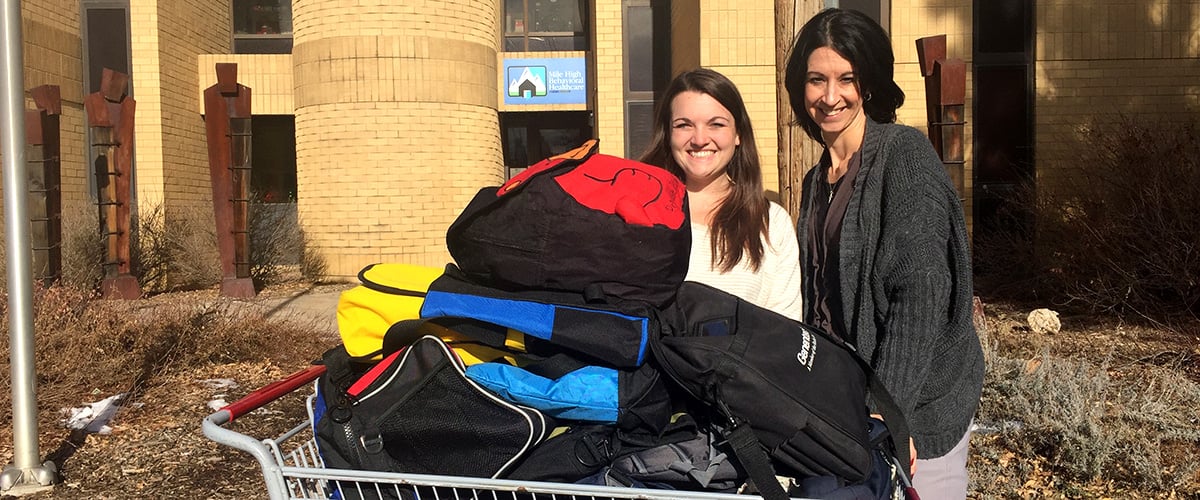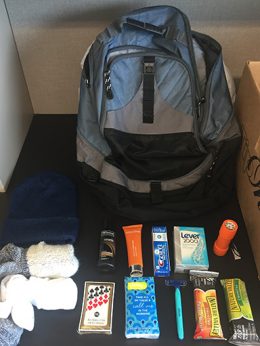 Volunteers help Matthews transport donations.
Volunteers help Matthews transport donations.
As a scientist, Shawna Matthews, PhD, was used to spotting problems and searching for solutions. But when she became concerned about the people experiencing homelessness in her community, the last place she expected to find a solution was in her daily commute to work.
 Shawna Matthews
Shawna Matthews
In fall 2015, Matthews began a postdoctoral fellowship researching breast cancer metabolism in the Department of Pathology at the CU School of Medicine. She noticed that her new commute required her to carry a lot of stuff between home and the Anschutz Medical Campus. “I left the house every day with a minimum of four bags,” she said. “And throughout the day, I seemed to accumulate more.”
On the opposite end of the spectrum were homeless veterans visiting the Mile High Behavioral Health Center on campus. Matthews observed them struggling to carry all of their possessions. “The contrast struck me and I wanted to do something about it.”
Connecting the campus to the community
Matthews had been looking for an opportunity to engage with her new campus. Her volunteer experience up until then was limited to acting as a science fair judge. But as she encountered the vets on campus and other experiencing homelessness in Aurora, she wondered how she could help.
The solution arrived via social media. On Facebook, Matthews saw her cousin in North Dakota was offering her acupuncture clinic as a drop-off site for the Turtle Project, a campaign that gathers and distributes backpacks and bags for the homeless.
The Facebook post resonated with her. “I sensed that this project could make a difference here,” she said. “My instinct was that CU Anschutz could pool the resources (and excess bags) that we have as scientists to help a population in our immediate community.”
Carrying their homes on their backs
 The Turtle Project accepts donations of bags and filler items.
The Turtle Project accepts donations of bags and filler items.
Last fall, Matthews looked into the background of the Turtle Project and learned that the campaign’s name of the campaign refers to the fact that, like turtles, people experiencing homelessness carry their homes with them. The original Turtle Project began in North Dakota, when Fargo resident Whitney Fear learned that the homeless were receiving donations but didn’t have a place to keep their things.
The relevancy of this problem struck a chord with Matthews. “Providing resources only addresses part of the problem,” she said. “People experiencing homelessness also need a way to carry their stuff, and to keep their possessions secure.”
With cooler weather and the holidays approaching, Matthews quickly organized her own Turtle Project at CU Anschutz. She put out a call for bags, personal care supplies and lightweight nonperishable food items. She connected with the Comitis Crisis Center, a division of Mile High Behavioral Healthcare, to receive the bags and distribute them to their clients.
[cucalloutbox align="left" color="" class="" size=""]
Donate a bag, backpack or supplies to the Turtle Project
Between now and mid-January, the Turtle Project aims to collect at least 200 bags, backpacks, and suitcases.
For more information about drop-off sites on the CU Anschutz campus, or for charitable contribution tax forms, please contact shawna.matthews@ucdenver.edu.[/cucalloutbox]
The project was a success. Matthews donated 98 bags to Comitis, whose homeless clients reported loving the bags. At each distribution event, there was more demand than supply, and those clients who didn’t receive a bag looked forward to the next delivery. Purses were especially popular. “The female clients were so excited,” Matthews said. “It’s fun getting a new purse.”
Turtle Project 2016
Matthews’ first campaign for the Turtle Project was such a success that she is organizing the project again this year. With additional volunteers, new drop-off locations, and increased storage space, she hopes to double the size of the collection. As of this writing, she had collected 35 bags in just a few weeks.
For those interested in helping, the project is soliciting donations of new or used bags, backpacks, large purses, conference bags, satchels and wheeled suitcases. These bags can be empty, or they can be pre-filled with small, useful items, such as hotel soaps, toothpaste, toothbrushes, razors, Q-tips, hats, socks, gloves, small flashlights with batteries, ponchos and lightweight nonperishable food, such as granola bars or trail mix.
Other useful donations include items that provide some entertainment, such as playing cards, pen and paper, paperback books and puzzle books. The Turtle Project accepts these filler items, which it can use to stuff empty donated bags.
Seeing the unseen
For Matthews, the project has been a way to connect with her neighbors and co-workers by sharing resources, as well as to acknowledge and help often overlooked members of the community. She’s stepped outside of her comfort zone, but the results have been worth it.
“In academia, you can sometimes feel like you are a small spoke in a very large wheel,” she said. “I think the same thing happens to the homeless. The Turtle Project is a way of saying that we see each other.”




